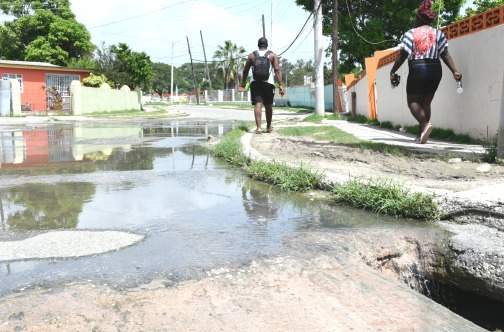(Jamaica Observer) Residents of Twickenham Park housing scheme in St Catherine are enraged.
Pointing to sewage flowing on the streets for months and, in some cases, seeping into houses, the residents were yesterday fuming that they are living in subhuman conditions.
The problem, they told the Jamaica Observer yesterday, has been plaguing the community for years, but this time the unhealthy and fetid waste water is not drying up, as it would in the past.
“This thing (pipe) burst from about in June or likkle over June. Me personally call customer service at National Water Commission (NWC) and them say them a send somebody. Is like after a time the water dry down and before a month pass, it start again. It has been running, running, running, and the rain came, and it’s worse,” resident Elaine Tyrell told the Observer.

Another resident, Jodi-Ann Gow, concurred. “It goes and and it comes. NWC said the sewage pump is having an electrical problem… a di pump break down mek the water come up ennuh, and we have been waiting, waiting, and waiting,” she said.
Tyrell interjected: “Some men came with their trucks, etc, etc. They looked at it (broken sewer) and seh somebody else fi come, and up to now I don’t see anybody else come. Nobody else has come.”
Fraser Deidrick showed the Observer where the sewage has been seeping into his house. “It come under the toilet bowl and reach in the kitchen and full up the place,” he said, then showed the news team bottles of bleach and disinfectants he uses to maintain some level of hygiene.
“Over a month now this a gwaan. Everything come up and come inside here. It use to flood and dem did fix the area, and then it stop. All of a sudden now, mussi ’cause out deh suh bang up, everything jus come up,” Deidrick said.
“Every morning mi wipe, although it nuh come in every day. When the water come up, the rat dem find themselves in yah. A poison mi set inna the week and them nyaam it off. Rat smell, every damn smell mi haffi a live wid yah suh,” he fumed.
“Mi deh here nearly 10 years and mi come and see it a gwaan. A nuh we one it affect, but wi get the most of it because we deh pan di lower end. Them thing deh we a live with,” he said.
Another resident, who does not live close to the broken sewer pipes, said that she, too, is still affected, as when it rains she has to find other ways to enter the scheme to get to her home.
A fifth resident, who spoke on condition of anonymity, told the Observer that when people visit her home they complain as they cannot stand in her yard for extended periods because of the scent of the sewage that basically runs in front her gate.
“It usually come up in the kitchen and bathroom,” she said. “Is a recurring thing ennuh. Years now it a happen and mi a live here from ’bout Gilbert, dem time deh,” the resident said.
Her reference was to Hurricane Gilbert which slammed into Jamaica on September 12 1988.
Yesterday, when the NWC’s Corporate Public Relations Manager Charles Buchanan was contacted, he said the company is working to address the issue as soon as possible.
“The NWC Waste Water Department is responsible for sewage operations for Twickenham Park Housing Scheme and it is a matter that is being addressed. However, the cause of the problem is the repeated disposal of non-biodegradable material that does not belong in the sewage system. It has caused frequent blockages and frequent damage to the equipment. The waste water team is actually working at effecting the repairs that are required and the subsequent clearance of the blockages,” Buchanan said.
“It is a problem we continue to have in that particular scheme, as well as others, where persons continue to discharge non-biodegradable material which do not belong in the central sewers, which then results in damage to the equipment and blockage of the sewers,” Buchanan added.
“We also have instances where persons are channelling storm water into the central sewers, which is also an offence, but people continue to do it,” he said.
He emphasised that the sewers are only designed to take sewage and other biodegradable content which comes from wash basins and kitchens.
“What you have happening is instances where persons breach the system and channel either the run-off water in their yards or the storm water from their roof into the sewers, and it means that when it rains the sewers are overcharged and are unable to carry the volume — because they are now being forcibly converted into not only being sanitary sewers, but trying to serve the purpose of storm water drain at the same time, and the system was never designed and could ever be expected to effectively serve as that,” he said.






